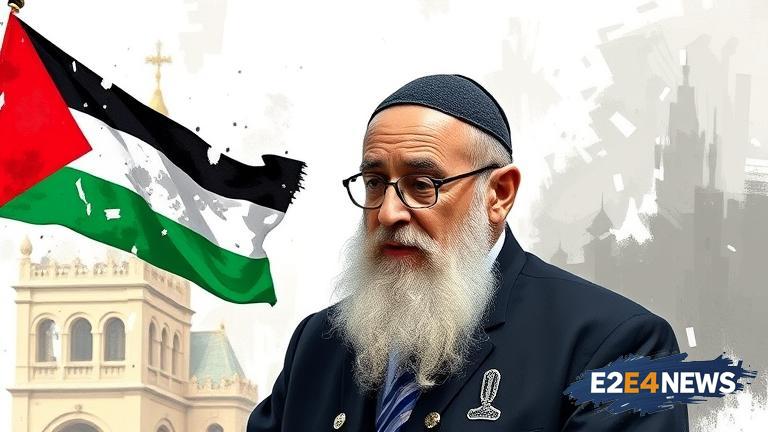The UK Chief Rabbi, Ephraim Mirvis, has strongly condemned the British government’s plan to recognize Palestine as a sovereign state, describing it as a ‘profound betrayal’ of Israel. This move has sparked a heated debate in the international community, with many questioning the timing and motivations behind the decision. The plan, which has been in the works for several months, aims to recognize Palestine as a sovereign state, with its own government and borders. However, the move has been met with fierce opposition from Israel and its allies, who argue that it undermines the peace process and ignores the complexities of the conflict. Rabbi Mirvis, who has been a vocal supporter of Israel, has expressed his deep concern and disappointment at the British government’s decision, stating that it is a ‘profound betrayal’ of Israel and its people. He argued that the move would only serve to embolden Palestinian extremists and undermine the chances of a peaceful resolution to the conflict. The Rabbi’s comments have been echoed by other Jewish leaders and organizations, who have expressed their outrage and disappointment at the British government’s decision. The plan has also been criticized by the Israeli government, which has accused the British of ‘stabbing Israel in the back’ and ‘ignoring the realities of the conflict’. The controversy has sparked a wider debate about the role of the international community in the Israeli-Palestinian conflict, with many arguing that recognition of Palestine is a necessary step towards a peaceful resolution. However, others argue that the move is premature and ignores the complexities of the conflict, including the issue of Palestinian terrorism and the need for a negotiated settlement. The British government has defended its decision, stating that it is a necessary step towards a two-state solution and that it will help to promote peace and stability in the region. However, the move has been met with skepticism by many, who argue that it is a symbolic gesture that will do little to address the underlying issues of the conflict. The controversy has also highlighted the deep divisions within the British Jewish community, with some leaders and organizations expressing their support for the government’s decision, while others have condemned it as a ‘betrayal’ of Israel. The debate has also sparked a wider discussion about the role of religion in international politics, with many arguing that religious leaders should play a more active role in promoting peace and understanding. However, others argue that religious leaders should remain neutral and avoid taking sides in conflicts. The controversy has also raised questions about the future of the Israeli-Palestinian peace process, with many arguing that the recognition of Palestine is a necessary step towards a peaceful resolution. However, others argue that the move will only serve to undermine the chances of a negotiated settlement and embolden Palestinian extremists. The international community will be watching the situation closely, as the controversy continues to unfold and the implications of the British government’s decision become clearer. The move has also sparked a reaction from other countries, with some expressing their support for the British government’s decision, while others have condemned it. The controversy has highlighted the complexities and challenges of the Israeli-Palestinian conflict, and the need for a negotiated settlement that takes into account the needs and concerns of both parties. The recognition of Palestine is a highly contentious issue, with many arguing that it is a necessary step towards a peaceful resolution, while others argue that it is premature and ignores the complexities of the conflict. The British government’s decision has sparked a heated debate, with many arguing that it is a symbolic gesture that will do little to address the underlying issues of the conflict. However, others argue that it is a necessary step towards a two-state solution and that it will help to promote peace and stability in the region. The controversy has also raised questions about the role of the international community in the conflict, and the need for a more nuanced and balanced approach that takes into account the needs and concerns of both parties.
